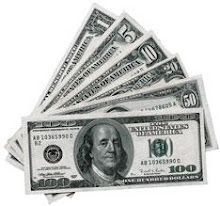
From: Business School 101
and Alamo bookkeeping Associates
Those big and little receipts. You are going to probably accumulate a lot of them. We were suppose to become a paperless society with the advent of the computer but it seems that now we just produce more paper a lot faster.
Receipts are important and there are different views on this. I believe that you should keep all your receipts because a lot of small purchases soon add up to big numbers.
For instance, you buy coffees at Starbucks for business client meetings. Most of those purchases individually are small, however if you add up 4.75 daily for coffees for 20 days you wind up with $95.00 in coffees for clients from Starbucks. Then multiply that by 12 months and it becomes a lot more. Therefore, to be better safe than sorry, I recommend you keep all those pesky little receipts. The IRS rules recommend keeping receipts for at least 3 years. If you buy an asset, which I will discuss in future postings, you may want to keep the receipts longer, because many assets have to be depreciated over several years.
However the IRS also states that if there is fraud involved on a tax return, there is no statute of limitations, which means they can go back more than 3 years. However if you are a small business, I would not worry about this too much, and you shouldn't be doing fraud anyway, it's not worth the pain it can cause you.
So how should receipts be stored? If you are just starting out, you can get an expandable folder with pockets and simply store them by month. Or you can begin categories such as phone, utilities, office supplies, etc. Whatever main categories of spending you do, make a tab label. However if you are not sure what categories you should use then just do it by month for now. Since bookkeeping is normally entered by monthly periods, it is easier to pull a receipt by month when you need to look something up.
Another way to do it is to buy some over-sized manila envelopes, label an envelope for each month, and stick the receipt in the appropriate envelope.
Now if you are buying file cabinets, you can use this same theory in your cabinets. Either file them by month or by type. Some businesses also file by the name of the company they purchased from, however this can get ridiculous especially if you buy something from a company only once. Do you really want to create a file for each company you buy from for one purchase? For now I recommend the simplest method, which is by month.
Next: Is there something I should write on those receipts?






